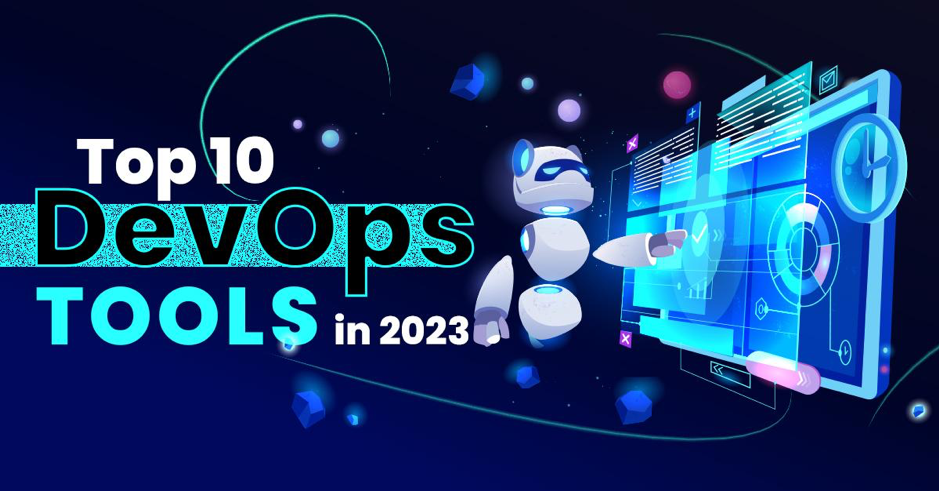Contents
Dependency on technology is increasing significantly, a significant surge is recorded. DevOps is a revolutionary domain of computer science that has brought a big change since its inception. DevOps acts as a connecting medium between various teams within an organisation associated with a product.
In this blog: Top 10 DevOps Tools in 2023 we will introduce you to multiple types of trending tools in the year 2023 that you need to master in the domain of DevOps. By the end of this blog, you will be able to have a glimpse of all the mentioned tools.

Introduction to DevOps
DevOps is a software development methodology that emphasises collaboration, communication, and integration between software developers and IT operations teams. The goal of DevOps is to improve the speed and quality of software development and deployment by breaking down the barriers between developers and IT operations teams.
At ground level, DevOps is a cultural shift that encourages developers and IT operations teams to work together more closely and share responsibility for the entire software development and deployment process. This includes everything from planning and coding to testing, deployment, and maintenance. In the year 2023, investing your time and money in the domain of DevOps will pay you well. But, to ace the game of DevOps you should enrol in a DevOps Training Course. This will lay a solid foundation at the same time validating your knowledge.
Top 10 DevOps Tools to master in the year 2023
Azure DevOps
Azure DevOps is an all-in-one tool that allows developers to manage their code, track work, and deploy applications. The platform provides a range of features, including version control, continuous integration and delivery, project tracking, and more. Azure DevOps offers seamless integration with other Microsoft tools, such as Visual Studio, and can be used on a range of operating systems, including Windows, Linux, and macOS.
Visual Studio Code
Visual Studio Code is a lightweight, cross-platform code editor that offers a range of features, including syntax highlighting, code completion, debugging, and more. The tool can be used for a range of programming languages and offers a range of extensions that can be used to customise the editor to your needs.
Splunk
Splunk is a powerful and comprehensive log analysis tool that allows organisations to collect, analyse, and visualise data from various sources. Splunk provides an intuitive interface for indexing, searching, and correlating machine-generated data in real time. It is a versatile tool that can be used for a range of use cases, including application monitoring, security analysis, and business analytics.
Splunk collects data from a range of sources, including log files, metrics, and events generated by systems, applications, and devices. The collected data is indexed and stored in Splunk’s proprietary data format, enabling fast and efficient search and analysis. Splunk also offers powerful search and visualization capabilities, allowing users to extract valuable insights from their data.
PowerShell
PowerShell is a command-line shell and scripting language that is designed for system administrators and developers. The platform can be used to automate tasks, manage Windows and Linux systems, and more. PowerShell offers a range of features, including scripting, remote management, and more.
SQL Server
SQL Server is a relational database management system (RDBMS) that is designed to store and retrieve data for applications. The platform can be used to manage large data sets, create data warehouses, and more. SQL Server offers a range of features, including data integration, analysis, and reporting.
Jenkins
Jenkins is an open-source automation server that is used for continuous integration (CI) and continuous delivery (CD) of software applications. It allows developers to automate the building, testing, and deployment of software applications by providing a platform for integrating code changes made by multiple developers into a single shared repository.
Jenkins provides a variety of features, including support for multiple operating systems and programming languages, integration with a variety of tools and services, and a flexible plugin architecture. It can be configured to run automated tests, static code analysis, and other quality assurance checks, ensuring that code changes meet the required standards before being integrated into the main repository.
GitHub & GitLab
GitHub and GitLab are web-based hosting services that allow developers to store, manage, and share their code. These platforms offer a range of features, including version control, code review, and issue tracking. They both offer seamless integration with other Microsoft tools, such as Visual Studio Code and Azure DevOps.
Docker
Docker is a containerization platform that allows developers to package their applications and dependencies into a single unit called a container. The platform can be used to build, ship, and run applications in a consistent environment. Docker offers a range of features, including container orchestration, image management, and more.
Kubernetes
Kubernetes is an open-source container orchestration platform that is designed to automate the deployment, scaling, and management of containerized applications. The platform can be used to manage containers across multiple hosts and provides a range of features, including load balancing, automatic scaling, and more.
Terraform
Terraform is a tool that allows developers to define and manage their infrastructure as code. The platform can be used to provision infrastructure resources, such as virtual machines, containers, and more. Terraform offers a range of features, including version control, testing, and more.
Conclusion
Congratulations on making it to the finals of the blog. In this, we had a brief discussion on the top 10 DevOps tools you need to master in the year 2023. Using these top DevOps tools in 2023 can help organisations streamline their development and deployment processes, enhance collaboration, and reduce time to market. In conclusion, organisations should consider incorporating these top DevOps tools into their development and deployment processes to stay competitive in the ever-changing technological landscape.



